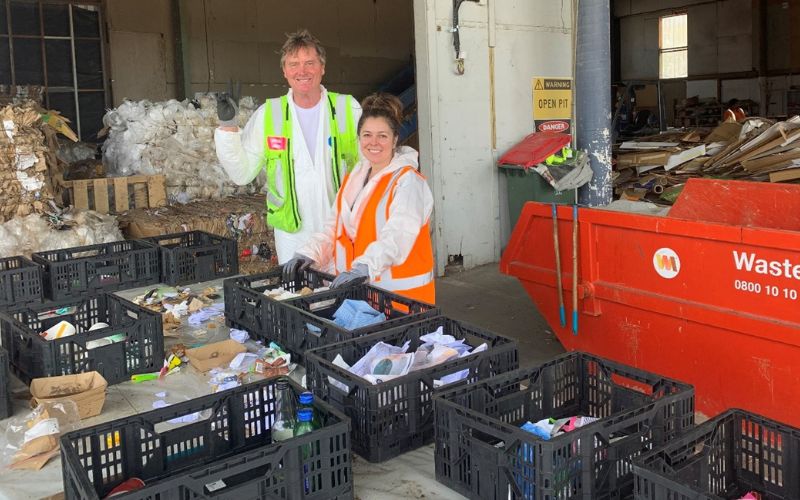Marlborough Airport aims to reduce landfill waste by one-third

Marlborough Airport’s Operations Manager Steve Holtum and Sustainability Lead Stephanie Floressort the recycling
With passengers back at pre-pandemic levels at Marlborough Airport, the piles of waste headed for landfill have returned.
Marlborough Airport recently conducted a waste audit with WM New Zealand to better understand waste streams, recycling rates and areas for improvement. WM New Zealand has done similar audits across the country, but this was its first in Marlborough.
The airport has set a target to reduce tonnage headed to landfill by at least one-third.
Over the past year, the airport’s 312,000 passengers, visitors and tenants generated about 43 tonnes of waste with 75 per cent going to landfill, and 25 per cent for recycling.
“We’d love to flip those numbers, or work with our tenants and partners to remove waste streams altogether. Most of the waste in our landfill skip was predictable but also preventable,” Operations Manager Steve Holtum said.
The airport’s waste to landfill over the past year equated to roughly 22 tonnes of greenhouse gas emissions, which contribute to Bluegums Landfill’s overall emissions. Bluegums is Council’s largest source of greenhouse gas emissions.
“We have identified some quick wins with organic waste already, like using the coffee grounds from CPR café on our landscaping,” the airport’s Sustainability and Communications Lead Stephanie Flores said.
“Our biggest issue at the airport is contamination of recycling. If someone throws a half-full coffee cup in a terminal recycling bin, it contaminates the whole bin.”
The airport’s board of directors recently adopted its first comprehensive sustainability policy. The airport is working on several initiatives across water, waste to landfill and greenhouse gas emissions.
More initiatives underway include an improved bin system for waste inside the terminal, more native plantings and greenspace within the car park, and investigating sustainable options in capital projects. Most recently, the airport has commissioned a study to investigate the practicality of an on-site solar farm.
